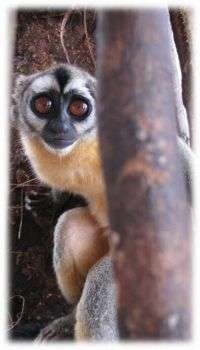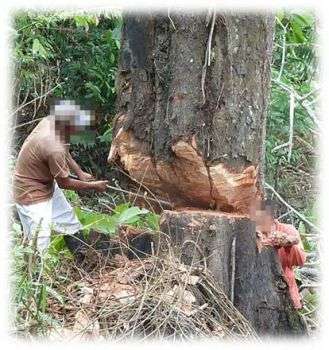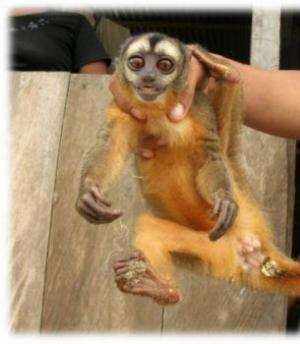Biologist's research helps protect rainforest monkey from illegal hunting

Research by University of Sussex environmental biologist Dr Mika Peck and environmental campaigners has helped to protect vulnerable populations of owl monkeys in the Peruvian rainforest from being illegally hunted and captured for use in medical testing.
Dr Peck, whose current work includes investigating the hunting of primates in Ecuador and Colombia, used Freedom of Information data, nocturnal forest surveys and interviews with hunters in the field to build a picture of hunting abuses and of the illegal trade in owl monkeys (Aotus nancymaae, A. vociferans), supposedly being trapped under permit and sold for use in medical research over the border in Colombia, primarily for research into malaria.
Owl monkeys are known to be affected by a form of often deadly human malaria, making them useful to malaria research.
Dr Peck worked with award-winning environmentalist Dr Angela Maldonado to conduct the research, which is now published in the American Journal of Primatology. Last July he also paddled the Amazon to raise funds for a research boat to support Angela's work at the Colombian conservation organisation Entropika.
The authors' findings show that 912 owl monkeys, including A. nancymaae captured in Peru, were trapped over a three‐month period in 2012 to supply a malaria research facility based in Leticia, Colombia, which had trapping permits for the use of only 800 A. vociferans annually. The long term illegal trapping in Peru led to significantly lower densities of owl monkey species compared to Colombian sites with low hunting pressure.

The authors also found that the Peruvian monkeys were being released into Colombian monkey territory after research had finished. The impact of their presence on resident monkeys remains unknown.
The trapping method, which involves clearing trees around the owl monkey sleeping site before trapping them in nets, has had a significant environmental impact, with loss of over 65,000 trees (including sleeping sites), annually.
Aotus species such as owl monkeys are registered under the Convention of International Trade in Endangered Species of Wild Fauna and Flora (CITES) Appendix II, and as such international trade requires official permission and evidence that extraction does not impact wild populations.
However, no official records exist and CITES legislation has failed, due principally to a lack of appropriate monitoring by national authorities responsible for compliance.

The research data collected formed the basis of a successful court challenge by the environmental group Enotropika and the Colombian authorities have now revoked all trapping permits relating to owl monkeys.
Dr Peck says: "The illegitimate nature of illegal wildlife trade, estimated to be worth some £8 billion per annum, makes it a particularly difficult aspect of biodiversity loss to quantify and police. In this case study of the illegal use of nocturnal primates in medical research in the Colombian and Peruvian Amazon, enforcement of national and international laws meant to protect species only took place after the conservation organisation Entropika took legal action – at no small risk to the Colombian members of the conservation organisation.
"We suggest that there should be greater integration between information generated on illegal wildlife trade and impacts to wild populations and the environmental authorities responsible for policing the trade."
More information: 'Research and in situ Conservation of Owl Monkeys Enhances Environmental Law Enforcement at the Colombian‐Peruvian Border', Angela M. Maldonado, Mika R. Peck, American Journal of Primatology, Published online in Early View, February 2014 in Wiley Online Library. DOI: 10.1002/ajp.22260
Journal information: American Journal of Primatology
Provided by University of Sussex




















